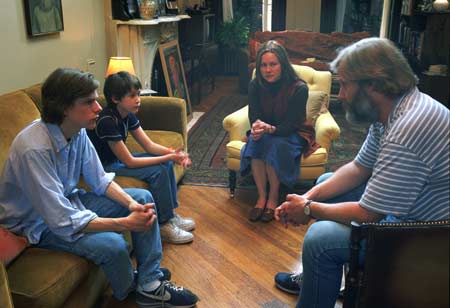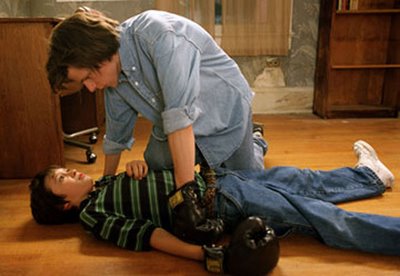
As Walt Berkman (Jesse Eisenberg) rushes to the American Museum of Natural History to look squarely at his childhood fear/joy in the abrupt finale of Noah Baumbach's The Squid and the Whale (2005), I almost did not have time to realize the movie was over. This giddy hiccup-and-lunge, like climbing a staircase and thinking there's one step more than there really is, has its place in cinema, and I think Baumbach chooses his well. The Berkmans have been falling apart, sometimes hilariously, sometimes painfully, but never without a clear sense of direction--which makes sense, since Baumbach gives us, as my wife immediately responded when I asked her what she thought of it, "the most realistic picture of divorce" one could wish for/dread. And a breakup such as the Berkmans suffer has no direction, unless you accept the metaphors of inevitability--the storm, the plane crash--whose only "patterns" are the sickening necessities of the tumbling pull of gravity, downward movement accompanied by splatter-patterns. And in The Squid and the Whale, the last arc of trajectory in such a drop does lead to some conclusion, or re-lived recognition, as Walt reclaims his mother, and maybe then his ability to live on--as his mother does.
 I'm not too sure about the father, Bernard (Jeff Daniels, once again better than we'll ever know), or his auto-eroticized son, Frank (Owen Kline, sad and true). The father's loss makes sense: His own failures, abetted by his wife, but nurtured by himself, create a trap from which he peers, and this position is oddly enough also my only remaining source of sympathy for him. There is something rueful and touching about his egoism, so that by the end I'm glad Walt is able to run from him, but I cannot forget the damage Bernard has done--and OK, the mother broke what may be the biggest promise, fidelity, and I will not lay all blame at one doorstep; but Frank's descent seems so closely linked to his father's, begun years before Frank was born, that I feel a particular measure of Bernard's culpability. Just as Frank is trying to figure out his own identity--within the family and his own body--the one he might need the most, his father, falls apart. Again, Laura Linney's Joan Berkman adds to the confusion with her own "solution": the affairs, particularly with the stay-over Ivan (William Baldwin--and aint this another gem of a performance, my brother?); Frank isn't even sure where his "bone structure" comes from, and he falls toward Ivan as a potential model, while marking his sexual territory as best he can. And let us not forget his drinking problem(!), as real a part of that realism Baumbach achieves as one could fear.
I'm not too sure about the father, Bernard (Jeff Daniels, once again better than we'll ever know), or his auto-eroticized son, Frank (Owen Kline, sad and true). The father's loss makes sense: His own failures, abetted by his wife, but nurtured by himself, create a trap from which he peers, and this position is oddly enough also my only remaining source of sympathy for him. There is something rueful and touching about his egoism, so that by the end I'm glad Walt is able to run from him, but I cannot forget the damage Bernard has done--and OK, the mother broke what may be the biggest promise, fidelity, and I will not lay all blame at one doorstep; but Frank's descent seems so closely linked to his father's, begun years before Frank was born, that I feel a particular measure of Bernard's culpability. Just as Frank is trying to figure out his own identity--within the family and his own body--the one he might need the most, his father, falls apart. Again, Laura Linney's Joan Berkman adds to the confusion with her own "solution": the affairs, particularly with the stay-over Ivan (William Baldwin--and aint this another gem of a performance, my brother?); Frank isn't even sure where his "bone structure" comes from, and he falls toward Ivan as a potential model, while marking his sexual territory as best he can. And let us not forget his drinking problem(!), as real a part of that realism Baumbach achieves as one could fear.It's a mess, of course, but Baumbach keeps it all on track, with humor and ironic distance, as well as old-fashioned pathos and intimacy, until I could see the world he made with aching clarity. I was lucky, growing up, not to have to suffer such a descent--although my parents built their own working-class version of the Ph.D.'d Berkmans' urges toward distance and recrimination; The Squid and the Whale connects with my own childhood fears and uncertainties, with the added twist of Bernard's compensating disdain for just about everything around him. Now this is a sin I can identify with. I find myself resisting the urge to judge, to project my own insecurities on every little damn thing around me (read: other people), just to keep afloat the Good Ship Me. I am thankful for The Squid and the Whale's sharp light cast on such false pride, and the damage it can cause. I noticed how much I hated Bernard's faults, in part because they lurk within--or, to be honest, sometimes caper right there out in the open--while I keep trying simply to be a good man. When Bernard rejects A Tale of Two Cities and piggybacks on that a swipe against the dopes who run high schools, making students read the second-tier stuff, Baumbach gives me a much-needed double-dose: I resented Bernard's imposing of his insecurity-engendered rejection of the book onto his son, who agrees not to waste his time with it; and then cringed as I heard myself in Bernard as he bad-mouthed his son's teachers. There is something important about movies that unearth such foolishness in oneself.
 In The Life Aquatic screenplay, Baumbach gives us a delirious circus-version of the confluence of ego, insight, and folly. As painful as it is, I'm thankful he settled down--although not entirely forgetting the comedy of such things (and aren't we thankful also for that? Check out Walt's discussion with his girlfriend about how Kafka-esque Kafka is; I am tempted to write another entry just to discuss the comic elements)--with The Squid and the Whale to remind me of the sad physics of the fall, and to chide me for my excursions into the greasy waters of my own pride.
In The Life Aquatic screenplay, Baumbach gives us a delirious circus-version of the confluence of ego, insight, and folly. As painful as it is, I'm thankful he settled down--although not entirely forgetting the comedy of such things (and aren't we thankful also for that? Check out Walt's discussion with his girlfriend about how Kafka-esque Kafka is; I am tempted to write another entry just to discuss the comic elements)--with The Squid and the Whale to remind me of the sad physics of the fall, and to chide me for my excursions into the greasy waters of my own pride.
No comments:
Post a Comment